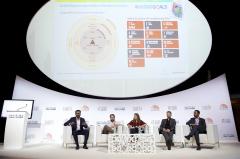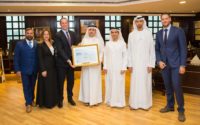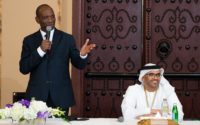Future Islamic Economy Trends Explored At GIES 2018
Future trends of the Islamic economy dominated discussions on the first day of the Global Islamic Economy Summit 2018 (GIES) in Dubai, the world’s largest forum dedicated to all aspects of the Islamic economy, which runs until October 31.
Held under the patronage of His Highness Sheikh Mohammed bin Rashid Al Maktoum, Vice President and Prime Minister of the UAE and Ruler of Dubai, GIES 2018 is gathering key decision makers, policymakers, government officials, business leaders and industry experts from around the world to discuss opportunities and challenges in the global Islamic economy.
During a panel session entitled “Innovation at the Edges”, industry experts discussed how in the age of the Internet of Things, wearables, drones, Artificial Intelligence and blockchain, there was a need for exponents of the Islamic economy to ensure that emerging technologies aligned with Muslim values. Joining the panel were James Faghmous, Computer Scientist at Stanford University; Muhammed Aurangzeb Ahmed, Principal Data Scientist at KenSci Inc; and Sofie Lindblom, CEO at Ideation360.
“Instead of focusing on new technologies, we should focus on problems to solve. We should think of solutions for the problems that affect people and use technology to develop them. Creating the technology is the easy part, but getting people to adopt it is the challenge. Depending on the context, focusing on the Muslim niche can be a good or a bad idea. It can sometimes lead to missed opportunities, failing to see that said good idea can benefit the wider community, not just Muslims,” said Muhammed Aurangzeb Ahmed.
The session entitled “Social Impact Entrepreneurship” discussed how the Islamic economy can play a bigger role in addressing global social challenges. Assessing how the Islamic economy could go beyond consumerism and drive social-impact entrepreneurship were Adnane Addioui, Co-Founder, and Chief Visionary Officer, Moroccan Center for Innovation and Social Entrepreneurship, Morocco; Katherine Budd, Co-Founder, NOW Money, UAE; Yousef Caires, VP, Expo Live, Expo 2020, UAE and Glen Mehn, Head of Development Innovation, NESTA, UK.
Katherine Budd used the discussion to highlight what she said was a gap in social investment in Islamic products because of a perception that they were niche – a perception that she said was wrong.
“There’s no point thinking as something as niche when it represents 25 per cent of the global population. You would never develop a product for children or the elderly and have investors say it’s niche. Halal products can grow well beyond their original intended market. Facebook is a great example. It started out as a means for university students to communicate and look at where it is now. Halal socially conscious products and services have the same potential,” she said.
The session was followed by another panel discussion focusing on Islamic fintech and the development of new and innovative products for digital banking, payment solutions, robo-advisory, and digital currencies and how they can being adapted to be Sharia compliant. Sharing their insights on the topic were Ashar Nazim, Managing Director of Finocracy, a Bahrain-based company that works alongside Islamic financial institutions to build and operationalise FinTech solutions. Contributing panellists were Rafe Haneef, CEO, CIMB Bank, Malaysia; Afaq Khan, Chairman, Al Rajhi Bank, Malaysia; Khalid Saad, CEO, Bahrain Fintech Bay, Bahrain; and Oliver Rajic, CEO, Alpha Fintech, Singapore.
“Banking is a sophisticated market and the customer demand is exponential, Fintech is a great equalizer for the banking methodology and to be able to take advantage of the change in the way of baking is the way forward,” said Khan.
Running contemporaneously with ‘Islamic Fintech’ and closing the first day of GIES 2018 was a session entitled ‘Global Islamic Economy Influencers,’ which took a closer look at how people can create an environment that fosters change and progress within the Islamic economy. Ahmed, Managing Partner at Unitas Communications Ltd, UK; Chris Blauvert, Co-founder, LaunchGood, USA and Lamya Al Haj, Assistant Professor at Sultan Qaboos University, Oman; led the discussion and shared their experiences in this area.
“My goal is to be a change-maker; I want to make a difference. Everybody wants change but nobody wants to change – that’s a very important point. I strongly believe that every single person can be a change-maker and can make a difference. You need to identify your roles in life and align your goals. You can drive positive change,” said Al Haj.
GIES 2018 is gathering over 3,000 delegates and features a comprehensive program of key note speeches, panel discussions, presentations and seminars. The fourth edition of GIES was organised by Dubai Chamber of Commerce and Industry and the Dubai Islamic Economy Development Centre in cooperation with Thomson Reuters as Strategic Partner.









 Email: info@cyber-gear.com
Email: info@cyber-gear.com